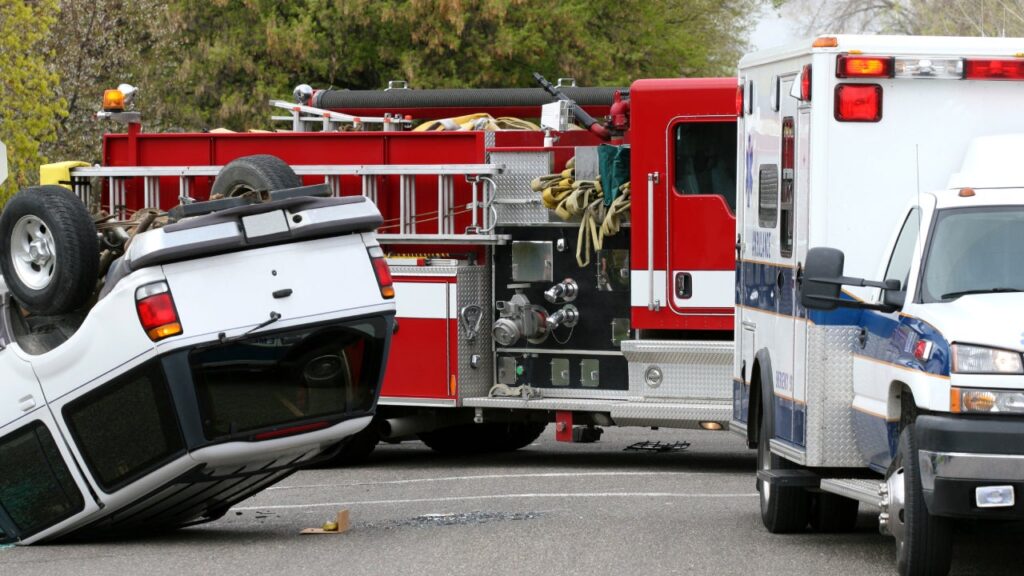Key takeaways
- Accidental death and dismemberment (AD&D) insurance provides coverage if you lose a limb or your death is the result of an accident.
- Between AD&D and term life, term life covers more causes of death.
- AD&D insurance can be purchased as a standalone policy or as a supplement to life insurance or voluntary employee benefits.
Accidental death and dismemberment (AD&D) insurance provides a death benefit to your beneficiary if you die an accidental death or a partial benefit if you lose a body part. Accidental death and dismemberment insurance can serve as a standalone policy or as a supplement to a life insurance policy and can be a cost-effective way to get more life insurance coverage. Knowing what AD&D insurance is, how it works and where you can get it can help you decide if this coverage is right for you.
What is accidental death & dismemberment (AD&D) insurance?
Accidental death and dismemberment insurance provides financial protection in the event of a serious accident. This type of policy pays out a benefit if you die due to a covered accident or suffer a significant injury that results in the loss of a body part or function. AD&D insurance can be obtained in various ways: through your employer as part of a benefits package, as a standalone policy or as a rider added to a standard life insurance policy.
AD&D insurance typically covers dismemberment or loss of function in these cases:
- Loss of a limb (e.g., arm or leg)
- Loss of vision, hearing or speech
- Loss of fingers, toes or an eye
Payouts may vary depending on the severity. For example, losing one limb or partial function might result in a 50 percent payout, while losing both limbs, full function, or accidental death usually leads to a 100 percent payout.
While AD&D offers valuable protection, it’s essential to understand that this policy has limitations. It only covers accidents and is not designed to replace comprehensive life insurance policies like term or permanent life insurance.
Voluntary AD&D
Accidents (unintentional injuries) are the third-leading cause of death in the United States, which is especially relevant in the workplace. This is where employer-offered voluntary AD&D insurance can play a significant role.
Voluntary accidental death and dismemberment insurance is a type of coverage offered through employers, often as part of a benefits package. In many cases, the premiums are either fully or partially paid by the employer, making it an affordable option for employees. Employees may also have the option to purchase extended coverage for additional protection. This type of AD&D coverage provides a financial safety net in the event of an accident, whether it occurs in or outside the workplace.
However, it’s important to note that this coverage only lasts while you’re employed with the company. If you leave your job, your voluntary AD&D coverage typically ends unless conversion options are offered.
Standalone AD&D coverage
For those looking for broader coverage, standalone AD&D policies are available through many insurance providers. This option allows individuals to purchase AD&D coverage directly, independent of their employer. Standalone AD&D policies may offer more comprehensive benefits, including higher coverage limits and additional options for accidental injuries. While premiums may be slightly higher than voluntary AD&D, the benefit of having coverage even if you change jobs or are self-employed can be worth the investment.
AD&D rider
An AD&D rider can be added to a traditional life insurance policy to provide supplemental coverage in the event of accidental death or dismemberment. Adding this rider offers extra protection alongside your existing life insurance coverage, typically for a relatively low additional cost. The benefit of having an AD&D rider is that it enhances your overall protection without needing to purchase a separate policy. The rider typically remains active as long as your life insurance policy is in force.
How does AD&D insurance work?
AD&D insurance functions similarly to life or health insurance in that it pays out a defined benefit when a covered event occurs, such as accidental death or severe injury. The coverage is fairly straightforward — if you suffer a covered injury or die in an accident, the insurance provider pays out a percentage or the full benefit to either you or your beneficiary.
One key feature of AD&D insurance is that approval is typically guaranteed, meaning you don’t need to go through a medical exam to qualify. However, it’s important to note that the payout eligibility is limited to accidents, which is why medical underwriting is not usually required.
Coverage for injuries varies based on the policy and provider, and the payout for specific injuries is typically outlined in the policy. For example, losing one limb may result in a 50 percent payout, while losing both limbs or eyesight could result in a 100 percent payout. Similarly, accidental death often results in the full benefit, with certain policies offering a higher payout — sometimes double or triple — if the accident occurs while you’re a fare-paying passenger on public transportation, such as a bus or airplane.
AD&D policies attached as riders to life insurance may offer the benefit of both the life insurance payout and the additional AD&D payout if death occurs due to an accident.
What does accidental death and dismemberment cover?
AD&D insurance provides coverage for death or serious injuries resulting from accidents. This includes various incidents that may lead to accidental death or loss of body parts or functions.
Some examples of what AD&D may cover include:
- Car accident death (unless caused by a natural event, like a heart attack)
- Drowning
- Workplace accidents
- Slip and fall accidents
- Fire-related deaths or injuries
- Fare-paying passenger death on public transportation (bus, train, taxi, ferry, airplane)
- Murder
- Crushed by fallen objects
- Lightning strikes
- Loss or partial loss of a limb, finger, eye or ear
- Loss or partial loss of function, including eyesight and hearing
What doesn’t accidental death and dismemberment cover?
While AD&D covers a variety of accidents, it does have several exclusions. These exclusions can vary between policies and providers, so it’s important to review the specifics of your policy. Common exclusions include:
- Death from illness, such as cancer or diabetes
- A drug overdose
- Suicide or death related to mental illness
- High-risk activities such as car racing, skydiving or scuba diving
- Injuries or death due to war or military combat
- Death resulting from driving under the influence of alcohol or drugs
- Death caused by bacterial infections
- Death during surgery
- Death of a professional athlete during a sporting event
- Death while committing a crime
Which life insurance companies offer AD&D?
Accidental death and dismemberment is available from many companies that offer life insurance, although some only sell policies to employers who then award them to employees as a benefit.
Here are a few of the insurers from whom you can purchase an AD&D policy or rider:
- Corebridge Financial policies are available for anyone between age 18-80 who work in high-risk professions, such as firefighters and police.
- TruStage policies are available for members of credit unions. Additional coverage increases automatically each year at no additional cost, up to 50 percent in 10 years.
- Protective offers AD&D riders to its life insurance policies.
- Aflac offers accidental death insurance for personal use or for employees.
- Mutual of Omaha offers AD&D coverage with additional benefits, including family, travel and catastrophe protection options. Coverage includes spouse and child education, seatbelt and airbag benefits and modifications for home and vehicle adjustments following catastrophic injuries.
Is accidental death insurance worth it?
Accidental death and dismemberment insurance can provide additional protection, but it’s not for everyone. If you already have a comprehensive life insurance policy, an AD&D policy may only be beneficial as extra coverage. However, if you’re unable to qualify for traditional life insurance due to health issues, AD&D may be a viable option since approval is often guaranteed. Keep in mind that this coverage only pays for accidental death or dismemberment, not for deaths caused by illness or other natural causes.
Pros of AD&D
- More affordable than term life insurance.
- Provides a payout for accidental death or serious injury, offering financial support in tough situations.
- Can be added as a rider to life insurance for additional peace of mind.
- Partial payouts for partial loss of limbs or body functions.
Cons of AD&D
- Only pays for accidental death or injuries — no coverage for death due to illness or natural causes.
- May not be necessary if you already have sufficient life insurance coverage.
- Some policies have exclusions, such as deaths related to medical procedures, overdoses or high-risk activities.
Is accidental death and dismemberment insurance the same as life insurance?
AD&D insurance and life insurance are not the same. While both offer coverage for accidental death, AD&D is much more limited, only paying out in specific scenarios involving accidents or dismemberment. On the other hand, life insurance provides broader protection, covering both accidental and natural death, including illness, though suicide is typically excluded in the first two years of most policies.
Because of its limitations, AD&D is usually cheaper than traditional life insurance. But for most people, life insurance is a better option due to its comprehensive coverage. Life insurance can include riders, such as AD&D, for added protection and flexibility. Here’s a quick breakdown of the differences:
AD&D
- Coverage: Pays a benefit if the insured dies from an accident or suffers a dismemberment, with partial payouts for loss of limb or function.
- Limitations: Does not cover death from natural causes; only accidental events are covered.
- Pros: Affordable, can be added as a rider to life insurance, and often includes double indemnity for certain scenarios, such as accidents while traveling on public transportation.
- Cons: Limited to accidents and dismemberment; does not cover illness or death from natural causes.
Life insurance
- Coverage: Pays out whether death occurs from an accident or illness.
- Limitations: Suicide is not covered in the first two years; other exclusions depend on the specific policy.
- Pros: Provides comprehensive coverage, typically lasting 10 to 30 years for term life and lifetime (95 to 121 years of age) for permanent policies, and can include AD&D as a rider. It covers a wide range of causes, from illness to accidents.
- Cons: More expensive than AD&D; health status affects cost.
For younger people, who are statistically more likely to die in accidents, and those who work in hazardous professions, AD&D can be a useful supplement. However, for overall coverage and financial security, life insurance is the more reliable option.
Frequently asked questions
Read the full article here
















